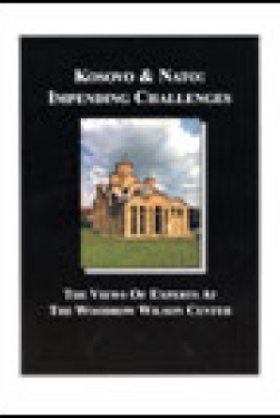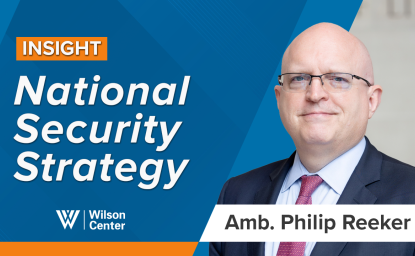"Kosovo and NATO: Impending Challenges. The Views of Experts at the Woodrow Wilson Center"


The 11 week war against Yugoslavia over Kosovo, a unique and unprecedented action by the Atlantic Alliance, is at best a strange and mixed victory for the United States and NATO. A defensive alliance went to war against a sovereign nation – which had not attacked any of the constituent members of the alliance – in the name of humanitarian principles. The consequences of this war over Kosovo will not only be enormous for the region as a whole but also for the role of NATO and U.S. relations with its European allies in the 21st century. Most fundamentally for US national interests, NATO will be consumed and transformed by Kosovo. Some are touting NATO’s role in Kosovo as a precedent and prototype of future NATO actions in other regions of the world, many others believe that the searing and often painful experience of Kosovo, and its huge post-war peacekeeping burden will make it more difficult to reach consensus within NATO on similar missions in the future. NATO may have won the battle of Kosovo, but in the process may also have weakened its ability and resolve to tackle future missions.
In March 1999, shortly before the start of NATO’s war in Kosovo, EES initiated a series of seminars and discussions on different aspects and implications of the crisis designed to apply the same scholarly and policy-oriented focus to the war in Kosovo that typifies the Wilson Center’s approach to all public policy issues. This volume brings together the highlights of several of these talks, which hopefully will provide useful insights on and analyses of the crisis to those who were unable to attend the sessions. In it you will find a wide variety of views, some supportive of the Administration and NATO’s approach, others critical. The intent of the report is to provide a balanced view of events in the region as well as U.S. and NATO policy, presented by a distinguished group of academics and policy experts.
CONTENTS
INTRODUCTION: THE CONSEQUENCES OF THE WAR IN KOSOVO (PDF 51.5)
Martin Sletzinger
NATO’s CALCULATION: NO ALTERNATIVE IN THE FORMER YUGOSLAVIA (PDF 67.5)
James Gow, Reader, War Studies, King’s College, University of London and Wilson Center Public Policy Scholar
THE KOSOVO CRISIS: LESSONS FROM BOSNIA AND THE FATE OF SOUTHEASTERN EUROPE (PDF 56.8)
John Lampe, Chair and Professor, Department of History, University of Maryland, College Park and former Director, East European Studies, Woodrow Wilson Center
U.S. POLICY IN THE BALKANS: FEDERATION AS AN EXIT (PDF 58.1)
Louis Sell, former Director, Office of Russian and Eurasian Analysis, U.S. Department of State and Woodrow Wilson Center Fellow
WHAT LESSONS DOES BOSNIA TEACH US? HANDLING THE KOSOVO CRISIS (PDF 59.5)
Paul Shoup, Professor, Department of Government and Foreign Affairs, University of Virginia, Charlottesville
HOW NATO AND OSCE SHOULD IMPLEMENT PEACE IN KOSOVO (PDF 70.7)
William H. Hill, former U.S. Foreign Service officer, U.S. Department of State and Wilson Center Research Scholar
SERBIA AFTER THE NATO BOMBING: A SENSE OF BETRAYAL (PDF 70.9)
Obrad Kesic, Director, Office of Governmental Affairs, ICN Pharmaceuticals, Inc.
CLEANSING KOSOVO (PDF 59.5)
David Binder, former New York Times correspondent in the Balkans
KOSOVO: THE INTERNATIONAL DIMENSION(PDF 61.9)
Louis Sell, former Director, Office of Russian and Eurasian Analysis, U.S. Department of State and Woodrow Wilson Center Fellow
THE YUGOSLAVE PERSPECTIVE: KOSOVO AND NATO’S CAMPAIGN (PDF 62.9)
Vladimir Matic, Visiting Professor, Clemson University and Wilson Center Public Policy Fellow
NEXT STEPS IN KOSOVO (PDF 63.0)
Steven Burg, Professor, Department of Politics, and Director, Center for German and European Studies, Brandeis University
THE (UN)MAKING OF MILOSEVIC (PDF 72.1)
Louis Sell, former Director, Office of Russian and Eurasian Studies Analysis, U.S. Department of State and Wilson Center Public Fellow
ADDENDUM
KOSOVO FROM THE ALBANIAN PERSPECTIVE: THE IMPACT OF REGIONAL CRISES ON ALBANIA’S TRANSITION TO DEMOCRACY (PDF 50.9)
Ambassador Agim Nesho, Permanent Representative, Mission of the Republic of Albania to the United States
KOSOVO FROM A BOSNIAN SERB’S PERSPECTIVE: THE IMPACT OF THE KOSOVO CRISIS ON BOSNIA (PDF 48.6)
Djordje Slavnic, Professor of Drama, Academy of Dramatic Arts, Sarajevo
Author

Global Europe Program
The Global Europe Program is focused on Europe’s capabilities, and how it engages on critical global issues. We investigate European approaches to critical global issues. We examine Europe’s relations with Russia and Eurasia, China and the Indo-Pacific, the Middle East and Africa. Our initiatives include “Ukraine in Europe”—an examination of what it will take to make Ukraine’s European future a reality. But we also examine the role of NATO, the European Union and the OSCE, Europe’s energy security, transatlantic trade disputes, and challenges to democracy. The Global Europe Program’s staff, scholars-in-residence, and Global Fellows participate in seminars, policy study groups, and international conferences to provide analytical recommendations to policy makers and the media. Read more

Explore More
Browse Insights & Analysis
Insights: Ambassador (ret.) Philip Reeker – Europe & the U.S. National Security Strategy

360° View of How Southeast Asia Can Attract More FDI in Chips and AI

The Growing Transatlantic “Big Tech” Rift Explained
